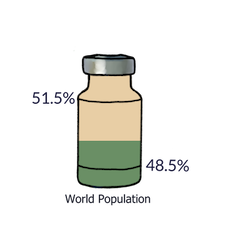As the pandemic rages on, some people are receiving their COVID-19 booster shots.
In December 2020, the Food and Drug Administration (FDA) issued the first approval for emergency use of a COVID-19 vaccine from Pfizer. While vaccination numbers started out stagnant, as of mid-November, 2021, over 51 percent of the world’s population has received at least one dose of a coronavirus vaccine, according to Our World in Data. This figure equates to over 4 billion people.
In the United States, according to the White House, over 175 million people have been fully vaccinated. This number represents more than half of the United States population. With these statistics also emerges a major obstacle for the Biden administration: administering booster shots to those already vaccinated.
In Indiana, just over half of the population is fully vaccinated, according to the Indiana State Department of Health. Brian Reed is the planning chief of the incident command structure at IU Health. This title put him in charge of leading the response during the pandemic. As far as booster shots are concerned, Reed says Hoosiers are receiving boosters at surprising rates.
“We gave more booster shots over the last couple weeks than we gave first doses,” he says, referencing data from the Indiana State Department of Health.
Following research published in the Lancet medical journal that points to the weakening of COVID-19 vaccine doses after six months, the CDC initially greenlighted booster shots for those 65 and older who received the Pfizer shot, as well as for those aged 18 and up with underlying health conditions. At this point, however, Reed says these eligibility groups are much larger.
“[The CDC] has really intentionally left [those eligible to receive the shots] a little vague,” he says. “They really want people to make their decision based on their own risk, and those 18 and up who want the booster shot can get it.”
One of those people to receive a booster shot was Michele Douglas, a substitute teacher from Indianapolis. Michele got her vaccine after closely observing her parents’ experience with it.
“My parents were the first ones who were eligible, so once they got vaccinated, I was one hundred percent totally for it,” she says.
The vaccine and its booster solved two major problems for Michele: one year of unemployment and the risk of visiting family members, such as her son at Indiana University (IU) Bloomington.
“When it started, I did not work just because of being exposed to people and the unknown of what was going on,” Michele says. “I have parents in their 80s and as the situation progressed with all the deaths, it was a pretty scary situation.”
According to the CDC, there are various potential side effects after taking the vaccine and its booster. Many people report headaches, sore arms, and tiredness, among other symptoms. Michele’s experiences with the vaccines varied.
“With my first shots, I had a sore arm, and I felt really tired,” she describes. “With the booster, I felt nothing.”
As time passes, more mandates are appearing for the vaccine. The Biden administration recently required vaccination for all federal employees. Although some politicians introduced legislation against mandatory COVID-19 vaccinations in response, Reed speculates that these vaccine mandates could have a domino effect.
“As Pfizer got the full FDA approval for certain ages and then certain government programs rolling out, too, we may see more employers or schools or other organizations requiring the vaccine,” Reed says.
Michele has seen these COVID-related mandates firsthand through her job as a substitute teacher.
“There is a mask mandate,” she says. “But also the majority of the teachers that I sub for are vaccinated.”
Though there are many doubts and anti-vaccine movements, Reed has one reassuring message.
“First and foremost, I would recommend anyone who hasn’t already gotten a vaccine to definitely get a vaccine,” he says. “Unequivocally, all of our doctors [at IU Health] are vaccinated and would all recommend getting the vaccine…They are incredibly safe and effective.”
Michele’s message is very similar.
“If we all do our part, we can get through this,” she says.
Hoosiers can get vaccinated or receive boosters in hospitals or local pharmacies such as CVS and Walgreens. If you are unsure of where to go to receive yours, visit vaccines.gov or text your zip code to 438829.
Sources: The Food and Drug Administration (FDA), Our World in Data, Our World in Data, The White House, Indiana State Department of Health (ISDH), ISDH, Reuters, CDC, CDC, The White House, FDA
Featured Image: Milo Hardison



